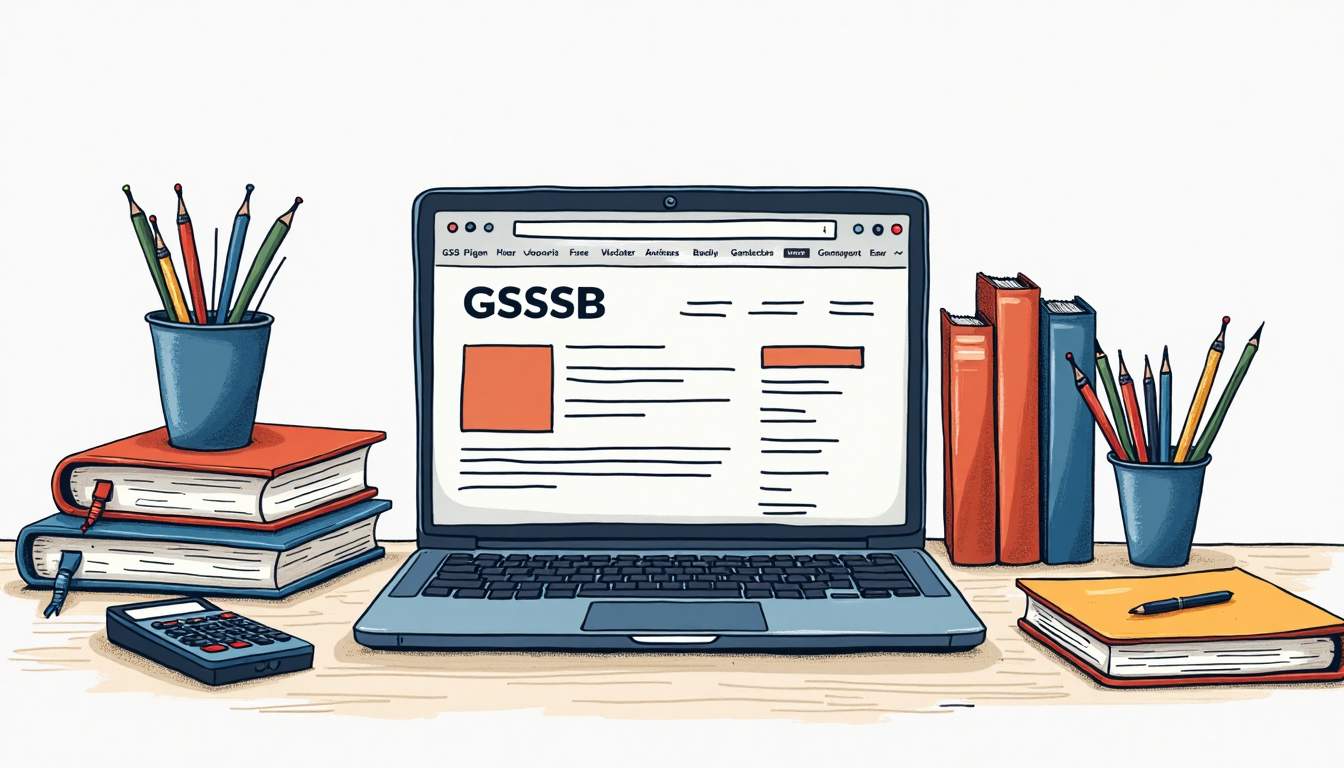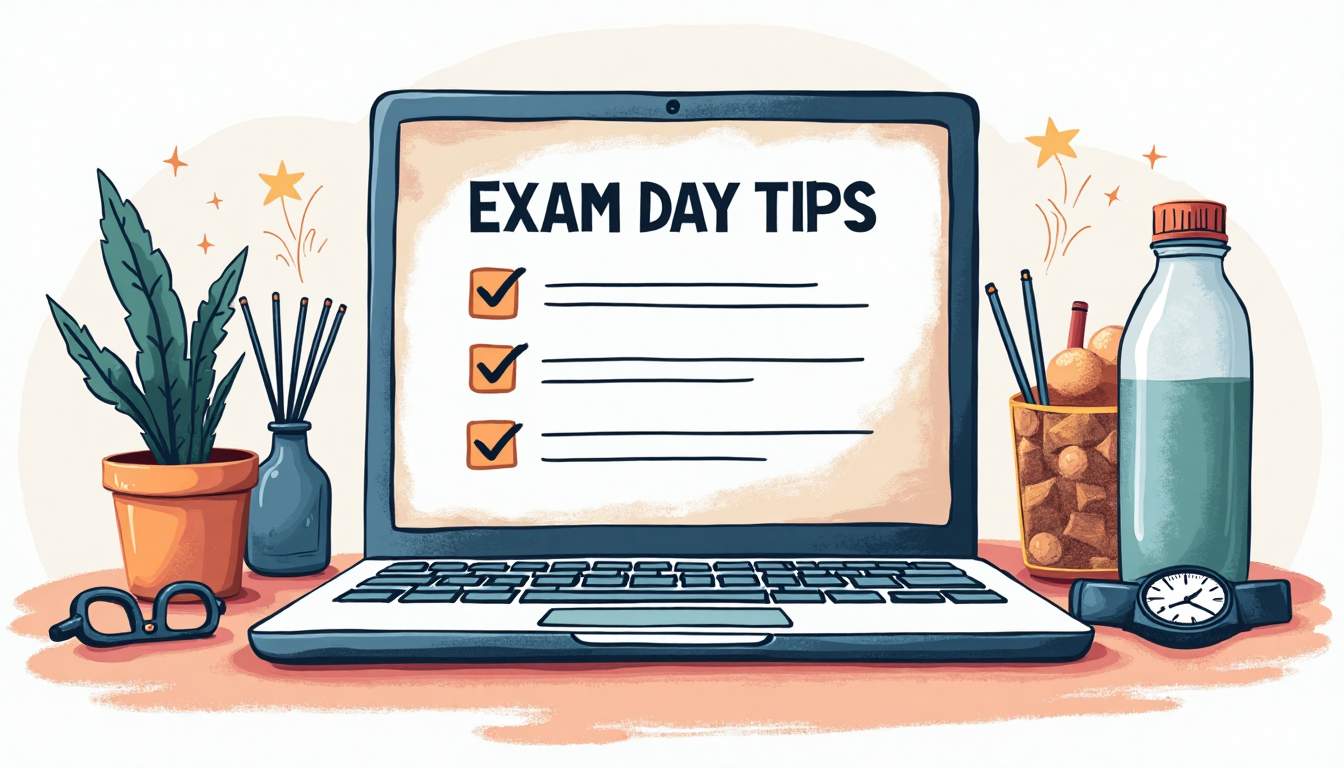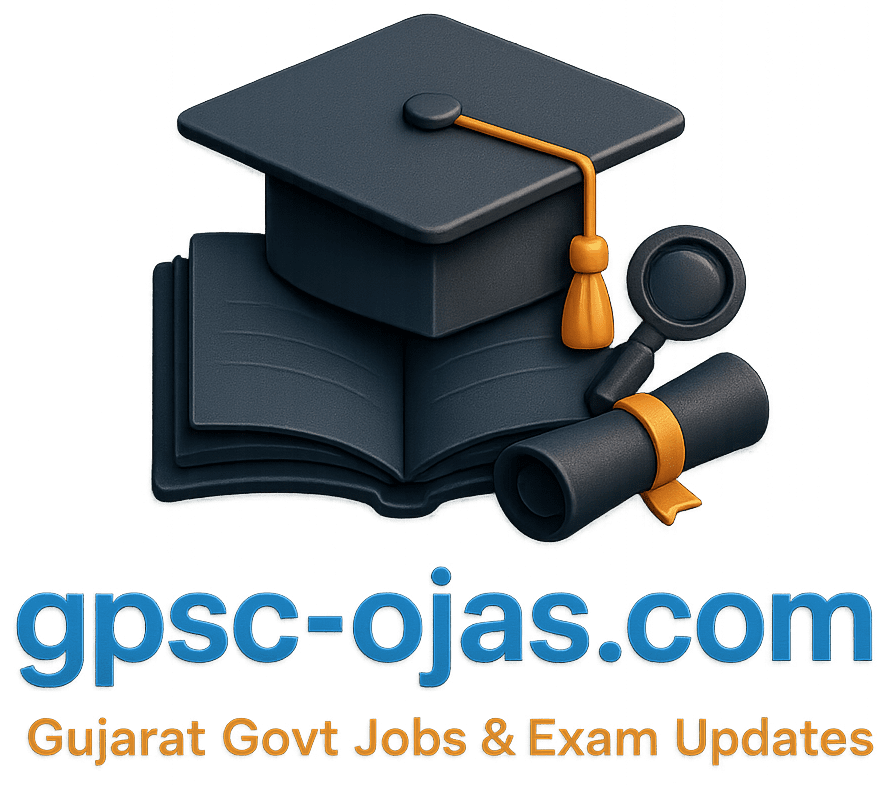The Gujarat Subordinate Service Selection Board (GSSSB) conducts various examinations for recruitment in different departments of the Gujarat government. The OJAS (Online Job Application System) is an essential platform for candidates to apply for these positions. This article serves as a comprehensive guide for downloading the GSSSB OJAS question paper and preparing effectively for the exams.
Understanding GSSSB and OJAS
The GSSSB is responsible for selecting candidates for various posts in the state government. It conducts exams to assess candidates’ knowledge and skills relevant to the job roles. OJAS, on the other hand, is an online platform that simplifies the application process, making it easier for candidates to apply for jobs and access necessary resources. This digital transformation has significantly increased the efficiency of the recruitment process, allowing for quicker turnaround times in application processing and results dissemination, which is crucial in a competitive job market.

The Importance of Question Papers
Question papers from previous years are invaluable resources for candidates preparing for GSSSB exams. They provide insights into the exam pattern, types of questions, and the difficulty level of the tests. Analyzing these papers can help candidates identify important topics and focus their studies accordingly. Furthermore, practicing with these papers not only boosts confidence but also enhances time management skills, as candidates learn to navigate through questions under timed conditions. This practice can be pivotal in improving overall performance on the day of the exam.
How to Access the GSSSB OJAS Question Paper
Accessing the GSSSB OJAS question papers is straightforward. The papers are usually available on the official GSSSB website. Candidates can navigate to the examination section, where they will find links to download previous year question papers. It is advisable to download papers relevant to the specific exam one is preparing for, as different posts may have different syllabi. Additionally, candidates should also consider joining online forums or study groups where they can share resources and discuss strategies. Engaging with peers can provide new perspectives on tackling difficult subjects and can lead to a more comprehensive understanding of the exam material.
Preparation Strategies for GSSSB Exams
Effective preparation is crucial for success in GSSSB exams. Here are some strategies to enhance your preparation process.
Create a Study Schedule
Developing a study schedule is essential for systematic preparation. Allocate specific time slots for each subject, ensuring that you cover the entire syllabus before the exam date. A well-structured timetable helps in managing time efficiently and reduces last-minute stress. Additionally, consider incorporating short breaks into your study sessions to maintain focus and avoid burnout. This approach not only enhances retention but also allows you to return to your studies with a refreshed mind, ready to absorb new information.
Focus on the Syllabus
Understanding the syllabus is key to effective preparation. The GSSSB exam syllabus typically includes subjects like General Knowledge, Gujarati Language, English Language, and Mathematics. Make sure to review the syllabus thoroughly and prioritize topics based on their weightage in previous exams. Furthermore, it can be beneficial to gather additional resources such as reference books, online courses, or video lectures that provide deeper insights into complex topics. Engaging with diverse materials can enhance your understanding and provide different perspectives on the subject matter.
Practice with Mock Tests
Mock tests are an excellent way to assess your preparation level. They simulate the actual exam environment and help you manage time effectively during the exam. Regularly practicing mock tests can also improve your speed and accuracy, which are crucial for scoring well. In addition to taking these tests, analyze your performance after each one. Identify your strengths and weaknesses, and adjust your study plan accordingly. This reflective practice will not only help you solidify your knowledge but also build your confidence as you approach the exam day.
| Advt. No. | Exam Name | |
|---|---|---|
| 184/201920 | Accountant/Auditor/Sub-Treasury Officer (Accountant Superintendent Class-3) | View |
| 177/201819 | Supervisor Instructor (Computer Group) | View |
| 170/201819 | Supervisor Instructor (Electrical Group) | View |
| 168/201819 | Supervisor Instructor (Fabrication Group) | View |
| 167/201819 | Supervisor Instructor (Mechanical Group) | View |
| 176/201819 | Supervisor Instructor (Plastic Group) | View |
| 174/201819 | Supervisor Instructor (Automobile Group) | View |
| 173/201819 | Supervisor Instructor (Civil Construction and Infrastructure Group) | View |
| 178/201819 | Supervisor Instructor (Beauty Culture and Hair Dressing Group) | View |
| 179/201819 | Supervisor Instructor (Garments Group) | View |
| 184/201920 | Accountant/Auditor/Sub-Treasury Officer (Accountant Superintendent Class-3) | View |
| 177/201819 | Supervisor Instructor (Computer Group) | View |
| 170/201819 | Supervisor Instructor (Electrical Group) | View |
| 168/201819 | Supervisor Instructor (Fabrication Group) | View |
| 167/201819 | Supervisor Instructor (Mechanical Group) | View |
| 176/201819 | Supervisor Instructor (Plastic Group) | View |
| 174/201819 | Supervisor Instructor (Automobile Group) | View |
| 173/201819 | Supervisor Instructor (Civil Construction and Infrastructure Group) | View |
| 178/201819 | Supervisor Instructor (Beauty Culture and Hair Dressing Group) | View |
| 179/201819 | Supervisor Instructor (Garments Group) | View |
| 187/202021 | Sub Inspector Instructor Class-3 | View |
| 187/202021 | Sub Inspector Instructor Class-3 | View |
| 189/202021 | Deputy Accountant/Sub Auditor | View |
| 196/202021 | Wireman | View |
| 192/202021 | Additional Assistant Engineer (Mechanical) | View |
| 195/202021 | Sanitary Inspector | View |
| 193/202021 | Chemical Assistant | View |
| 191/202021 | Senior Scientific Assistant | View |
| 197/202021 | Manager Grade-2 (Guest House/Rest House Manager) | View |
| 194/202021 | Horticulture Inspector | View |
| 254/202425 | Gujarati Stenographer Grade-2, Class-3 | View |
| 225/202324 | Deputy Accountant/Sub Auditor and Accountant, Auditor/Sub Treasury Officer/Superintendent | View |
| 225/202324 | Deputy Accountant/Sub Auditor and Accountant, Auditor/Sub Treasury Officer/Superintendent | View |
| 226/202324 | Research Assistant and Statistical Assistant, Class-3 | View |
| 212/202324 | Gujarat Subordinate Services, Class-3 (Group-A and Group-B) | View |
| 212/202324 | Gujarat Subordinate Services, Class-3 (Group-A and Group-B) | View |
| 212/202324 | Gujarat Subordinate Services, Class-3 (Group-A and Group-B) | View |
| 201/202223 | Gujarati Stenographer Grade-2, Class-3 | View |
| 187/202021 | Sub Inspector Instructor Class-3 | View |
| 187/202021 | Sub Inspector Instructor Class-3 | View |
Utilizing Previous Year Question Papers
Previous year question papers are not just for practice; they are a treasure trove of information that can guide your preparation. Here’s how to make the most of them.

Identify Patterns and Trends
By analyzing previous year question papers, candidates can identify recurring topics and patterns in the questions. This can help in predicting which areas are likely to be emphasized in the upcoming exams, allowing candidates to focus their studies more effectively. For instance, if certain themes or subjects appear consistently over several years, it is prudent to prioritize these areas in your revision schedule. Additionally, understanding the types of questions asked—whether they are multiple-choice, short answer, or essay-based—can help tailor your study approach accordingly, ensuring you are well-prepared for the format of the exam.
Time Management Skills
Working through past papers under timed conditions can significantly enhance your time management skills. Candidates can learn to allocate time to each question and develop strategies for tackling difficult questions without getting stuck. This practice not only builds confidence but also simulates the actual exam environment, reducing anxiety on the day of the test. Furthermore, by timing yourself, you can identify which sections of the paper consume more time and adjust your study habits to improve efficiency. This proactive approach can lead to a more balanced performance across all sections of the exam.
Review and Analyze Mistakes
After completing practice papers, it is essential to review your answers critically. Analyzing mistakes helps in identifying weak areas that need more attention. This reflective practice can lead to substantial improvement over time. It is beneficial to categorize mistakes into types—conceptual errors, careless mistakes, or time management issues—so that you can address each category with targeted strategies. Additionally, discussing your answers with peers or mentors can provide new insights and alternative approaches to problem-solving, enriching your understanding of the subject matter. Keeping a log of these mistakes and tracking your progress can serve as a motivational tool, showcasing your growth and areas that still require work.
Resources for GSSSB Exam Preparation
In addition to question papers, various resources can aid in preparation. Here are some recommended materials and tools.
Books and Study Materials
There are numerous books available specifically designed for GSSSB exam preparation. Look for books that cover the entire syllabus and include practice questions. Additionally, consider using guides that provide tips and strategies tailored to GSSSB exams. Some popular titles include comprehensive guides that not only explain concepts but also include previous years’ solved papers, which can give candidates a clear idea of the exam pattern and frequently asked questions. Furthermore, many of these books come with supplementary online resources, such as practice tests and answer keys, which can be invaluable for self-assessment.
Online Courses and Tutorials
Online platforms offer courses and tutorials that can be beneficial for candidates. These courses often include video lectures, quizzes, and interactive sessions that can enhance understanding of complex topics. Moreover, they can be accessed from anywhere, making them convenient for busy candidates. Many of these platforms also provide forums where students can ask questions and interact with instructors, fostering a collaborative learning environment. Additionally, some courses are designed to simulate the actual exam experience, helping candidates to manage their time effectively and develop strategies for tackling different types of questions.
Join Study Groups
Joining a study group can provide motivation and support. Engaging with peers allows candidates to share knowledge, discuss difficult topics, and stay accountable. Group studies can also make learning more enjoyable and less isolating. In addition to traditional study groups, many candidates are finding success in virtual study circles, where they can connect with others from different regions. These online platforms not only expand the pool of resources and perspectives but also allow for flexible scheduling, accommodating members’ varied commitments. Furthermore, organizing regular mock tests within the group can help participants gauge their progress and identify areas that need more focus, ultimately enhancing their preparation strategy.
Exam Day Tips
As the exam day approaches, it’s crucial to be well-prepared not just academically but also mentally. Here are some tips to ensure a smooth exam experience.

Get Adequate Rest
Rest is often overlooked in preparation, but it is vital for optimal performance. Ensure you get enough sleep the night before the exam. A well-rested mind is more alert and better able to recall information. Aim for at least 7-8 hours of quality sleep, as this can enhance cognitive function and improve memory retention. If you find it difficult to sleep, consider establishing a calming bedtime routine, such as reading a book or practicing gentle stretches to help ease your mind.
Stay Calm and Focused
On the day of the exam, it’s essential to stay calm. Practice relaxation techniques such as deep breathing or visualization to manage anxiety. A focused mind can significantly impact performance, so try to maintain a positive attitude. You might also find it helpful to engage in light physical activity, like a brisk walk or some yoga, to release endorphins and reduce stress levels. Remember, it’s normal to feel nervous; channel that energy into your concentration instead.
Read Instructions Carefully
Before starting the exam, take a moment to read the instructions carefully. Understanding the guidelines can prevent unnecessary mistakes and help in managing time effectively during the test. Pay attention to the format of the questions, whether multiple-choice, short answer, or essay, as this can influence how you allocate your time. Additionally, if there are any specific requirements for answering, such as the need to show your work in math problems, make sure to note these before diving into the questions. Taking this extra moment can save you from potential pitfalls later on.
Prepare Your Materials
Before the exam day, ensure that you have all the necessary materials ready to go. This includes items such as pens, pencils, erasers, a calculator, and any permitted notes or textbooks. Double-check that everything is in working order, especially if you rely on technology. Having a backup plan, like extra batteries or a spare calculator, can alleviate last-minute stress. Organizing your materials the night before can also give you peace of mind and allow you to focus on your exam strategy instead of scrambling for supplies on the day itself.
Arrive Early
On exam day, aim to arrive at the testing location well ahead of time. This will give you a chance to settle in, find your seat, and familiarize yourself with the environment. Rushing can heighten anxiety, so plan for potential delays, whether from traffic or finding parking. Use this time to take a few deep breaths and mentally prepare yourself for the exam ahead. Being in the right mindset can make a significant difference in how you approach the test and can help you feel more in control as you begin.
Conclusion
Preparing for the GSSSB OJAS exam requires a strategic approach, utilizing resources like previous year question papers, study materials, and mock tests. By following the guidelines outlined in this article, candidates can enhance their preparation and increase their chances of success. Remember, consistent effort and a positive mindset are key components of effective exam preparation.
In summary, download the question papers, create a study schedule, practice regularly, and stay calm on exam day. With dedication and the right strategies, achieving success in the GSSSB exams is within reach.
Take the Next Step in Your GSSSB Exam Preparation
Now that you’re equipped with knowledge on how to prepare for the GSSSB OJAS exam, it’s time to take the next step. Visit GPSC-OJAS.COM to stay updated with the latest Gujarat Government job notifications, exam details, and recruitment news. Our platform is your one-stop solution for all the resources you need to apply for and excel in government positions. Don’t miss out on any opportunities or updates that could give you the edge in your exam preparation. Visit Now and begin your journey to a fulfilling career in the Gujarat Government.
FAQs About GSSSB OJAS Syllabus
Q1: What is included in the GSSSB OJAS syllabus?
👉 The GSSSB OJAS syllabus includes subjects like General Knowledge, Gujarati Grammar, English, Quantitative Aptitude, Reasoning, and job-specific topics based on the post, such as Clerk, Office Assistant, or Technical positions.
Q2: Is the GSSSB OJAS syllabus the same for all posts?
👉 No, the syllabus varies depending on the post. For example, the Clerk exam focuses on general subjects, while technical or specialist posts include subject-specific knowledge. Always refer to the official notification for accurate details.
Q3: How often is the GSSSB OJAS syllabus updated?
👉 The syllabus is updated whenever GSSSB revises the exam structure or introduces new recruitment rules. Candidates should always refer to the latest official notification to get the most accurate syllabus.
